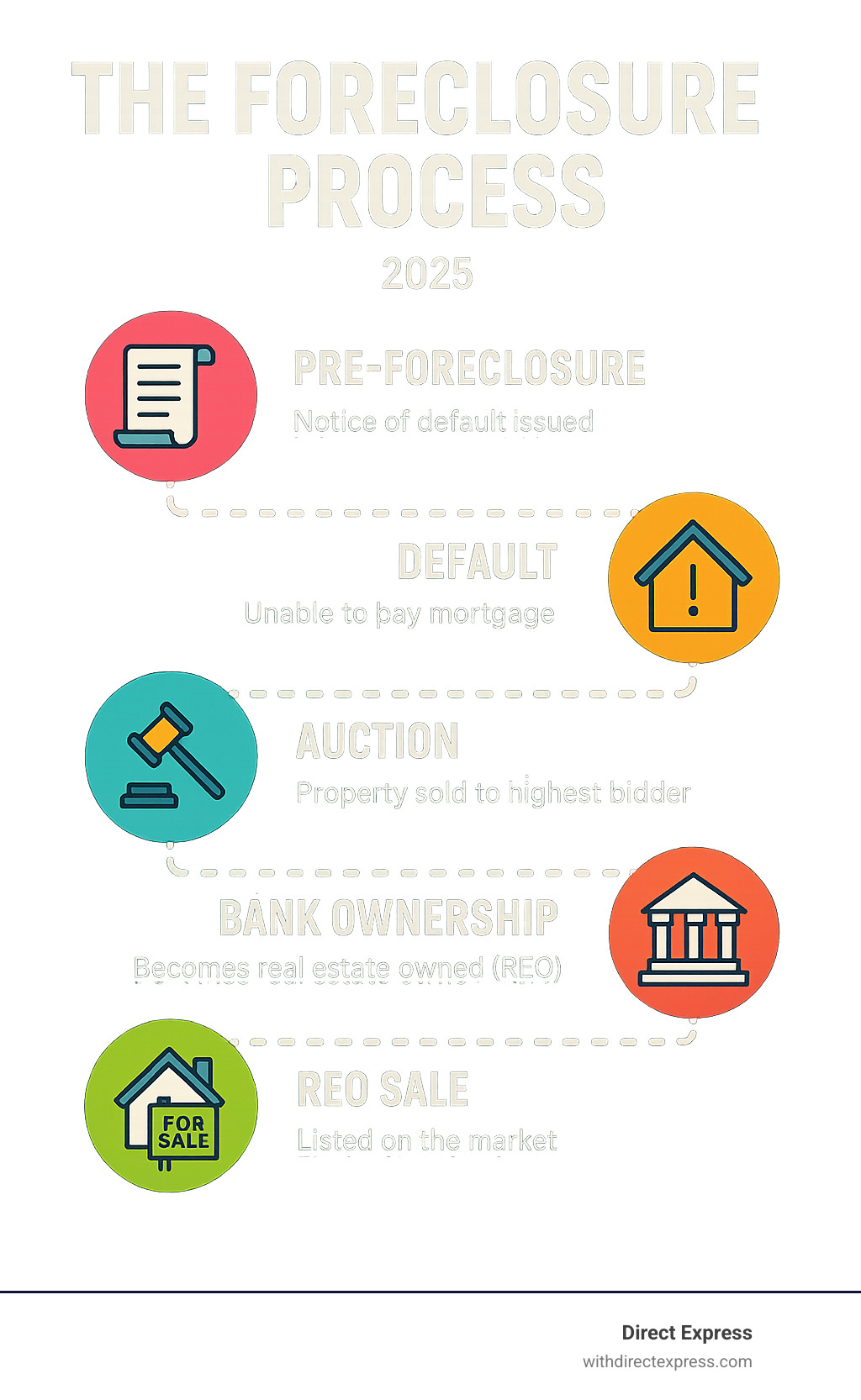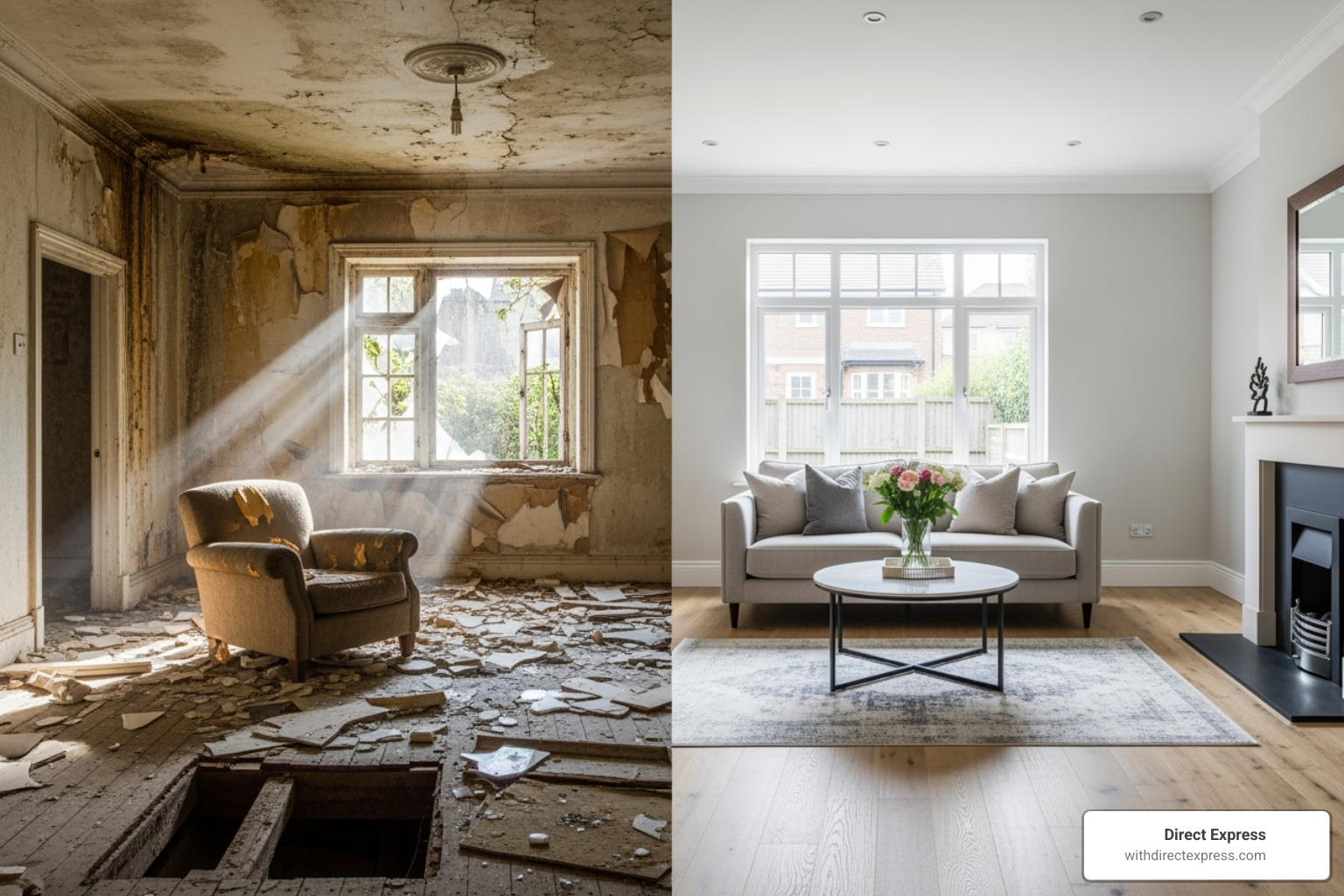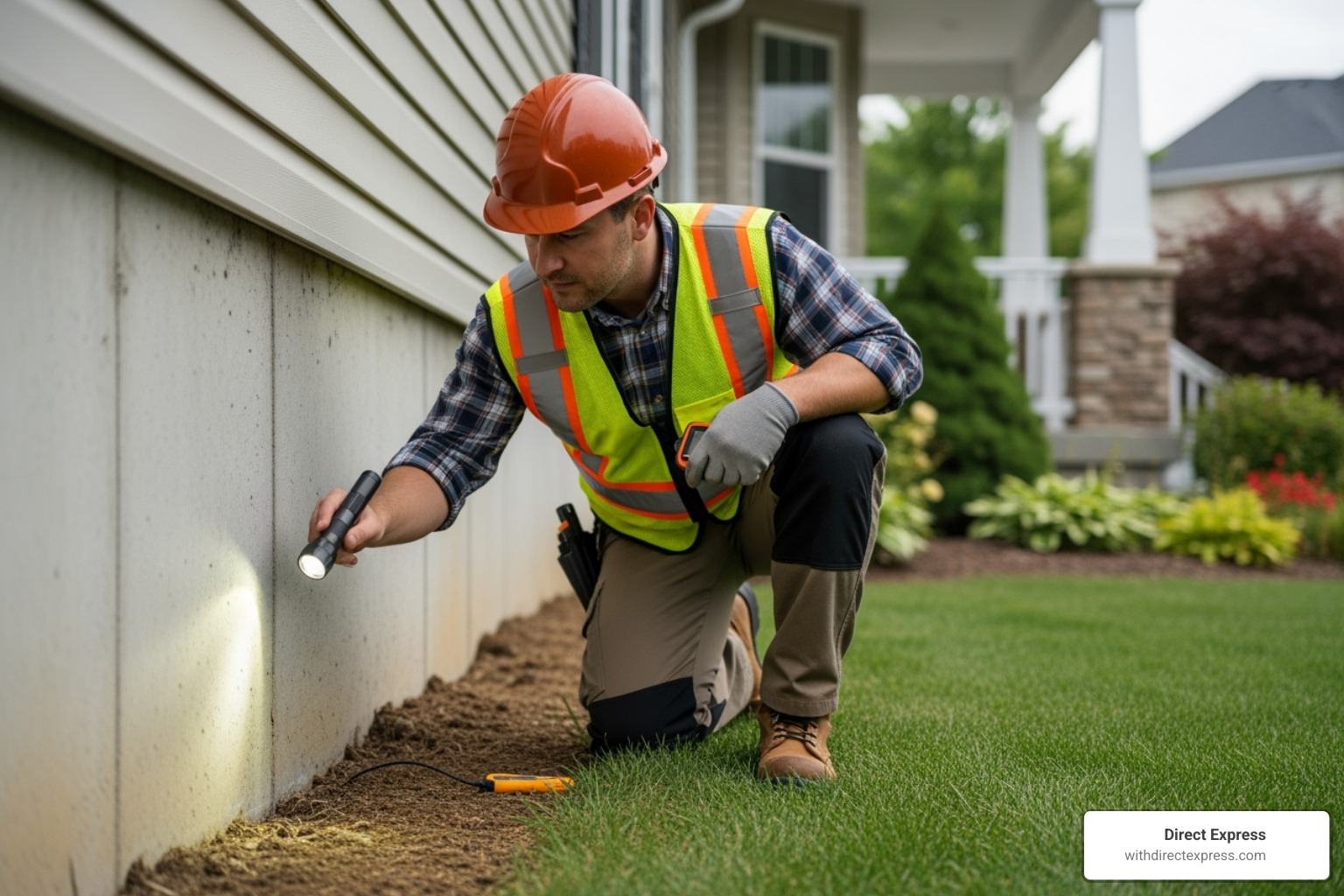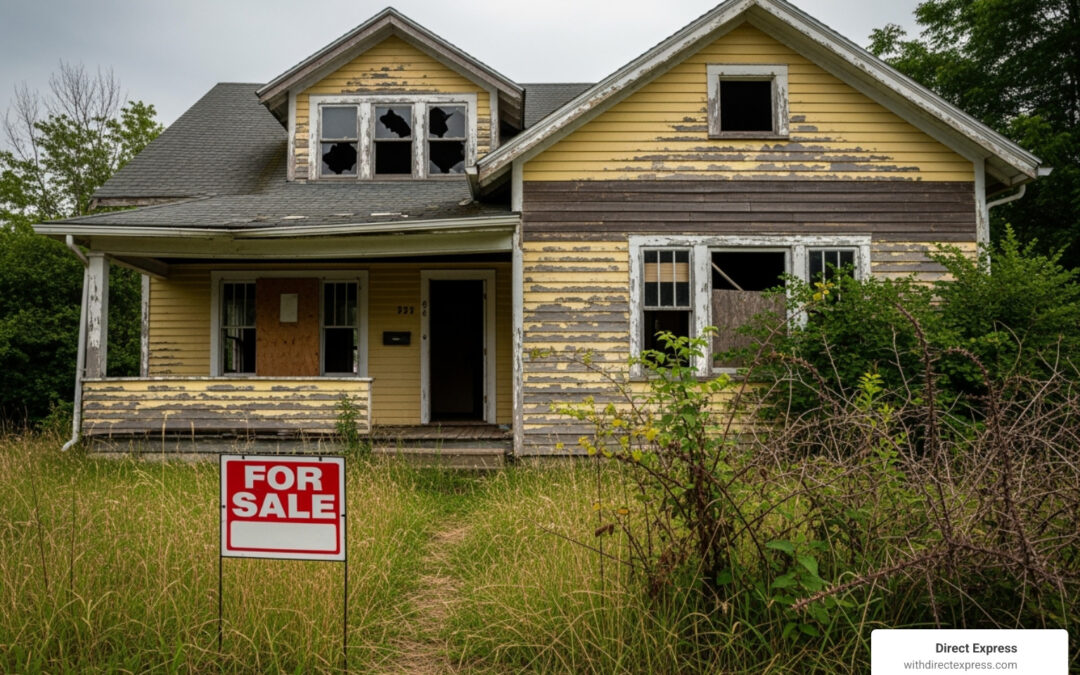Why Learning How to Buy Foreclosure Properties Can Be Your Path to Real Estate Success
Successfully buying how to buy foreclosure properties requires understanding the process, securing financing, and conducting thorough due diligence. This guide provides the essential roadmap.
Quick Steps to Buy a Foreclosure:
- Get pre-approved for financing before you start shopping
- Find properties through MLS, bank websites, or foreclosure specialists
- Research thoroughly – property condition, liens, and market value
- Make competitive offers or bid strategically at auctions
- Inspect carefully – most foreclosures are sold “as-is”
- Close with patience – the process often takes longer than traditional sales
Buying a foreclosed home offers the chance to purchase property significantly below market value. However, this venture has both potential rewards and inherent risks. Foreclosures aren’t for everyone. They are typically sold “as-is,” the approval process can be lengthy, and competition from investors is fierce.
The key to success? Understanding what you’re getting into before you make an offer.
As Joseph Cavaleri, Broker and CEO of Direct Express Realty, I have over two decades of experience guiding clients through the complexities of how to buy foreclosure properties. I’ve seen both the incredible opportunities and the costly mistakes that can come with these purchases.

How to buy foreclosure vocabulary:
Understanding Foreclosures: The Good, The Bad, and The Risky

A foreclosure is a property repossessed by a lender after a homeowner fails to make mortgage payments. Lenders want to sell these properties quickly to recoup their losses, often offering them at a significant discount. The catch is that these properties are sold “as-is.” This means the buyer is responsible for all repairs, which can range from minor cosmetic fixes to major structural problems. This risk is a primary reason for the lower price.
The repossession and sale process varies by location, which can impact the procedure and potential for negotiation. The potential for a good deal attracts high competition from investors and house flippers.
The Main Types of Foreclosure Sales
Understanding the different ways foreclosed properties are sold is crucial for anyone learning how to buy foreclosure. Each type comes with its own set of risks, rewards, and processes.
| Type of Foreclosure | Price (Potential Discount) | Risk Level (Buyer Risk) | Purchase Process (Who you deal with, Key Challenges) |
|---|---|---|---|
| Pre-foreclosure | High (often negotiate with owner) | Moderate (potential for hidden liens, owner motivation) | Deal directly with the homeowner before lender repossession. Can be emotional, complex, and require quick action. |
| Short Sale | Moderate (bank approval needed) | High (lengthy approval, bank can reject offers) | Homeowner sells for less than owed on mortgage; lender must approve. Very slow, uncertain, and difficult to finance. |
| Auction (Sheriff’s Sale) | Very High (can be deep discount) | Very High (sold “as-is,” no inspection, cash only, potential for hidden liens) | Public auction, often at courthouse. Cash payment required, no property access before sale. High risk, high reward. |
| Bank-Owned (REO) | Moderate (bank wants to sell quickly) | Moderate (sold “as-is,” but often cleared title) | Properties the bank repossessed after failing to sell at auction. Deal directly with the bank. Slower process, but generally clearer title. |
- Pre-foreclosure: The period after default but before repossession. You deal directly with a homeowner under stress, which can be complex.
- Short Sales: The homeowner sells for less than the mortgage balance, requiring lender approval. This process is notoriously slow and uncertain.
- Foreclosure Auctions (Sheriff’s Sale): Public auctions selling properties to the highest bidder, typically for cash. You buy “as-is” with no inspection, making it a high-risk, high-reward scenario.
- Bank-Owned Properties (REO): If a property doesn’t sell at auction, the bank takes ownership. While still “as-is,” REOs often have clearer titles. The process is slower but more straightforward than an auction.
Additionally, you can find Government-owned properties resulting from defaults on government-insured mortgages (FHA, VA). Agencies like the Department of Housing and Urban Development (HUD), Fannie Mae, and Freddie Mac have their own inventories and sales processes, often with buyer assistance programs. Direct Express can help you steer these options.
Advantages vs. Disadvantages
Before you jump into how to buy foreclosure, weigh the pros and cons.
Pros of Buying a Foreclosed Home:
- Lower Price: Lenders want to sell quickly, so foreclosed properties are often priced below market value, creating an opportunity for a significant discount.
- Increased Equity Potential: Buying low allows you to build equity faster, especially with smart renovations.
- Investment Opportunity: Foreclosures can offer high returns for house flippers or generate strong cash flow as rental properties.
- Cleared Liens (often with REOs): Bank-owned properties often come with a clear title, saving you from inheriting the previous owner’s debts.
Cons of Buying a Foreclosed Home:
- “As-Is” Condition: You inherit all problems, from cosmetic issues to costly structural defects. The previous owners likely deferred maintenance.
- Hidden Costs: Budget for legal fees, auction deposits, transfer taxes, and unexpected renovation costs. A home inspection, if possible, is just the starting point.
- Complicated Process: The paperwork and approval process, especially for short sales and REOs, can be lengthy and complex.
- Intense Competition: Desirable properties attract cash buyers and investors, leading to bidding wars that can erase the discount.
- Limited Inspection Access: Auctions rarely allow inspections. Even with REOs, access can be restricted, making it hard to assess the true condition.
- Occupancy Issues: The property may still have former owners or tenants, requiring a potentially costly and time-consuming eviction process.
The Step-by-Step Process of How to Buy a Foreclosure

Learning how to buy foreclosure properties successfully requires a clear strategy. The market has its own rules, and rushing in without understanding them can lead to costly mistakes. Patience is essential, as foreclosure purchases often take longer than traditional sales. Having professional guidance makes all the difference. For those new to home buying, our guide on Buying a Home covers the fundamentals.
Financial Considerations for How to Buy a Foreclosure
Before falling in love with a property, get your finances in order. The listing price is just the beginning.
- Get Pre-approved: This is essential to be taken seriously by sellers and to know your exact budget, which helps you avoid overbidding.
- Budget for Hidden Costs: The purchase price doesn’t include repairs, back taxes, liens, or legal fees. These can add up quickly.
- Build a Cash Reserve: Smart buyers build a cash reserve of at least 20% of the purchase price for unexpected repairs and holding costs.
- Account for Liens: While REOs often have clear titles, auction properties can come with liens (unpaid taxes, contractor bills) that become your responsibility.
- Factor in Legal Fees: Foreclosure paperwork is complex. An attorney specializing in real estate law should review all documents.
- Explore Financing: Work with experienced Mortgage Loan Officers to find financing that may include renovation costs.
How to Find Foreclosure Properties
Finding good deals requires knowing where to look.
- Specialized Real Estate Agents: They have access to the Multiple Listing Service (MLS) and relationships with bank asset managers, giving you an edge.
- Bank REO Lists: Most major banks list their foreclosed properties on their websites. These are often more accurate than third-party sites.
- Government Portals: Sites for HUD homes, Fannie Mae, and Freddie Mac often have properties in better condition and may offer special financing.
- Specialized Foreclosure Websites: These can be useful, but be cautious of subscription fees and outdated listings.
- Public Records: Local newspapers and county records announce upcoming foreclosure auctions, helping you find deals before they are widely known.
At Direct Express, we use our property search tools and expertise to help clients find and evaluate the best foreclosure opportunities.
The Bidding Process: How to Buy a Foreclosure at Auction or from a Bank
The way you make an offer depends on the type of sale.
Auction purchases are and high-risk. You’re often bidding on a property you haven’t inspected. Most auctions require a significant cashier’s check to participate, and you must be prepared to pay the full amount quickly, often in cash. Attending a few auctions as an observer first is a wise strategy.
REO purchases from banks are more like traditional sales but have their own rules. Banks are not emotional sellers; they want clean, straightforward offers with few contingencies. The bank’s internal approval process can be slow. Your offer should include proof of funds and a quick closing timeline. Lowball offers are typically rejected.
This is where the importance of a real estate agent from Direct Express shines. We know how to structure your bid to stand out and can guide you through the negotiation process with different banks.
Navigating Financing and Inspections

The “as-is” nature of how to buy foreclosure properties means due diligence is your superpower. You are buying a property that could have significant, hidden issues requiring costly repairs. Smart buyers budget for the worst-case scenario. Our construction and renovation services at Direct Express can provide realistic repair estimates to help you make an informed decision.
Getting a Mortgage for a Foreclosed Property
While cash is king, getting a mortgage for a foreclosed property is possible. Traditional lenders may hesitate if a home is in poor condition, but specialized financing options are available.
- Conventional Loans: These can work if the property is in relatively good shape and passes an appraisal.
- FHA 203(k) Loan: This government-backed loan finances both the purchase and renovation costs in a single mortgage, which is ideal for fixer-uppers.
- VA and USDA Loans: Veterans may use VA loans, often with no down payment. USDA loans are available for eligible properties in rural areas.
- Fannie Mae HomePath & Freddie Mac HomeSteps: These programs are designed for their specific REO properties and may offer closing cost assistance.
- Renovation Loans: Beyond the FHA 203(k), other conventional renovation loans can bundle purchase and repair costs.
A skilled Mortgage broker at Direct Express can match you with the right financing for a foreclosed property.
What to Look for During an Inspection
If you get inspection access (common with REOs, rare with auctions), treat it like gold. This is your only chance to uncover potential problems before you buy.
- Structural Issues: Check for foundation cracks, sagging floors, and roof damage, as these are often the most expensive repairs.
- Water Damage and Mold: Look for stains on ceilings and walls, which can indicate leaks and costly mold remediation.
- Roof Condition: Missing shingles or a sagging roofline can signal that an expensive replacement is needed.
- Outdated Systems: Old electrical wiring, plumbing, and HVAC systems can be inefficient, unsafe, and expensive to upgrade.
- Vandalism and Pests: Vacant homes are targets for vandalism, theft of fixtures, and pest infestations.
The biggest challenge is limited or no inspection access at auctions. This is why professional guidance is crucial. Our team at Direct Express, with in-house construction and plumbing expertise, can help you estimate potential repair costs, even with restricted access, turning guesses into informed decisions.
Is Buying a Foreclosure a Good Investment?

Is learning how to buy foreclosure properties a good investment? It can be, but only if you approach it with careful financial analysis. A foreclosure is only a good deal if the purchase price plus renovation costs are well below its After Repair Value (ARV).
For example, a $150,000 home needing $40,000 in repairs has a total cost of $190,000. If its ARV is $220,000, you have $30,000 in potential equity before accounting for holding costs (mortgage, taxes, insurance). Many investors use the “70% rule,” paying no more than 70% of the ARV minus repair costs, to ensure a profit margin.
Your investment strategy will likely be either flipping for quick profit or holding for rental income. Flipping requires efficient renovation and a quick sale, while renting provides long-term passive income and property appreciation. Our Invest services can help you analyze which strategy fits your goals.
Managing Your Foreclosure Investment
Once you’ve purchased and renovated your foreclosure, smart management is key to maximizing returns.
For house flipping, focus on strategic renovations that add value without over-improving for the neighborhood, such as kitchens, bathrooms, and curb appeal. Our construction team at Direct Express can help you plan renovations that deliver the biggest impact on schedule and budget.
For rental properties, being a landlord involves tenant screening, lease management, and maintenance. This can quickly become a second job. A comprehensive Property Management company like Direct Express is invaluable. We handle all aspects of management, from finding quality tenants to coordinating repairs, ensuring your investment generates passive income without the daily headaches.
Our integrated services mean we understand your property from the ground up. Since we may have helped you purchase, finance, and renovate it, we know its history and needs, providing better care and better returns for your investment.
Frequently Asked Questions about Buying Foreclosures
Here are answers to some of the most common questions about how to buy foreclosure properties.
How much cheaper are foreclosed homes?
Discounts can be 20% or more below market value, but this varies greatly by market, property condition, and competition. The true cost is always the purchase price plus all renovation expenses. In competitive markets with multiple bidders, any potential discount can shrink quickly.
What are the biggest risks of buying a foreclosure?
The main risks include:
- “As-is” condition: You could face expensive, hidden structural damage, mold, or system failures.
- Title issues: At auctions, you might inherit liens from unpaid taxes or contractor bills.
- Competition: Intense bidding from cash investors can drive prices up to market value or higher.
- Lengthy process: Bank approvals and short sales can take months with no guarantee of closing.
Can a first-time homebuyer purchase a foreclosure?
Yes, but it’s challenging. It requires a strong financial position with significant cash reserves for repairs and extensive research. Renovation loan programs like the FHA 203(k) can make it more feasible by financing both the purchase and repair costs. For a first-time buyer, working with an experienced real estate team like Direct Express is the best strategy for success. Our integrated services simplify a complex process, providing guidance on financing, renovation, and more under one roof.
Conclusion: Your Path to a Successful Foreclosure Purchase
Learning how to buy foreclosure properties can be a path to real estate success, offering significant savings and equity potential. However, it’s a high-risk, high-reward venture that demands careful preparation and a solid understanding of the process.
Success depends on thorough due diligence, patience, and expert guidance. Getting pre-approved for financing, building a cash reserve for unexpected costs, and working with professionals who specialize in foreclosures are crucial steps to avoid costly mistakes and turn a challenging purchase into a profitable investment.
At Direct Express, we offer an all-in-one solution for foreclosure purchases. Our integrated team helps you find, finance, inspect, renovate, and even manage your property. This streamlined approach provides you with a cohesive team that understands your goals and works together to achieve them, changing a daunting process into your next great opportunity.
Ready to turn your foreclosure dreams into reality? Start your search for a property today with Direct Express.









